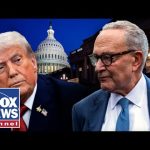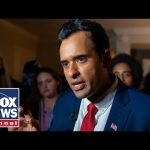In a highly anticipated showdown, the Supreme Court delved into a significant case concerning President Trump’s controversial tariffs. This case has the potential to alter the balance of power between the executive branch and Congress, raising essential questions about authority and economic strategy. With both sides of the aisle watching intently, the courtroom filled with notable figures, including various secretaries and lawmakers who came to witness the discussions unfold.
The crux of the case revolves around the tariffs imposed by President Trump and whether such actions can be considered a form of taxation. If they are, then the Constitution indicates that the power to levy taxes rests solely with Congress. This central question kicked off three hours of intense legal arguments, with every justice in attendance demonstrating a healthy amount of skepticism. Even some of the traditionally conservative justices, like Cavanaugh and Barrett, questioned the scope of the powers allocated to the president, suggesting that concerns regarding unchecked authority should be seriously examined.
As discussions heated up, Justice Cavanaugh mused over a thought-provoking scenario. He wondered why the president would be granted the authority to completely shut down trade but not to impose smaller tariffs. This line of questioning hints at the broader implications of economic decisions made under the guise of emergency powers, raising eyebrows among those concerned about executive overreach. If the president can leverage such expansive powers, where does that leave the legislative checks and balances designed to prevent tyranny?
Justice Jackson provided a counterpoint, emphasizing that the very legislation at stake was intended to equip Congress with protective measures against an overreaching executive. Her arguments reflected a concern that by allowing more power to the president in this area, Congress would effectively be relinquishing its authority, undermining the foundational balance of government power. This tug-of-war between the branches of government encapsulates the age-old battle of authority, making the outcome all the more crucial.
Beyond the courtroom battles, discussions arose about the potential ramifications of allowing the president to wield more economic power. Justice Barrett aptly noted that proceeding down this path could lead to a convoluted mess that may be difficult to untangle later. Questions like these underline the delicate balance lawmakers must maintain when navigating the complex waters of foreign trade and national economic strategy. As the justices contemplate the arguments presented, the nation’s eyes remain firmly fixed on the Supreme Court, eagerly awaiting a ruling that could shape the future of presidential power and congressional authority.




